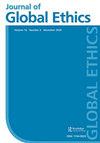The democratic deficit of the G20
Q2 Arts and Humanities
引用次数: 1
Abstract
ABSTRACT In the last few decades, the democratic credentials of global governance institutions have been extensively debated in the fields of international relations and political philosophy. However, despite their prominent role in the architecture of global governance, club governance institutions like the Group of Seven (G7) or the Group of Twenty (G20) have rarely been considered from the perspective of democratic theory. Focussing on the G20, this paper analyses its functions in international political practice and discusses whether, in exercising these functions, the G20 exhibits a democratic deficit. As a standard of democracy, the analysis uses the all-affected principle, according to which all those who are affected by a policy decision should be given the opportunity to participate in decision-making. This paper identifies several democratic shortcomings of the G20, for instance related to the exclusion of citizens of non-member states and a lack of parliamentary and public control. By describing realisable reforms that could to some degree alleviate these shortcomings, it is shown that more democratic institutional alternatives are feasible. Thus, the ascription of a democratic deficit to the G20 is warranted.二十国集团的民主赤字
在过去的几十年里,国际关系和政治哲学领域对全球治理机构的民主资格进行了广泛的争论。然而,尽管七国集团(G7)或二十国集团(G20)等俱乐部治理机构在全球治理架构中发挥了突出作用,但人们很少从民主理论的角度来考虑它们。本文以G20为研究对象,分析了G20在国际政治实践中的功能,并探讨了G20在行使这些功能时是否存在民主赤字。作为民主的一个标准,该分析使用了所有受影响的原则,根据该原则,所有受政策决定影响的人都应该有机会参与决策。本文指出了G20在民主方面的几个缺陷,例如排斥非成员国公民以及缺乏议会和公众控制。通过描述可以在一定程度上缓解这些缺点的可行改革,表明更民主的制度选择是可行的。因此,将民主赤字归咎于G20是有道理的。
本文章由计算机程序翻译,如有差异,请以英文原文为准。
求助全文
约1分钟内获得全文
求助全文

 求助内容:
求助内容: 应助结果提醒方式:
应助结果提醒方式:


